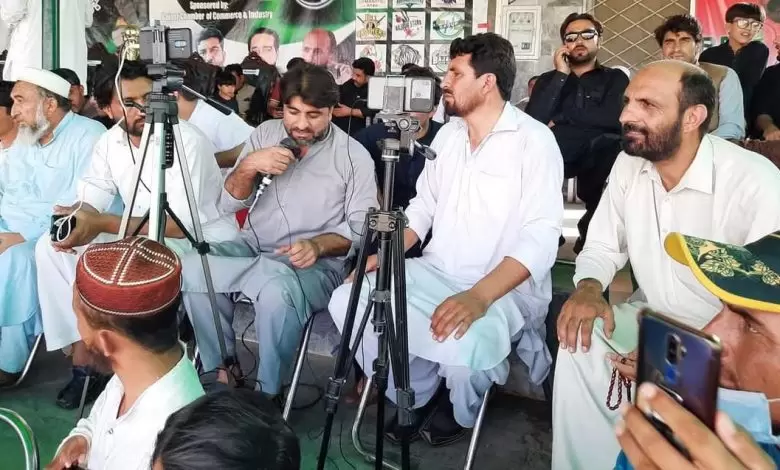
In Pakistan's merged tribal districts, particularly Bajaur, journalists face severe financial hardships, often working without any remuneration and covering expenses from their own pockets.
Despite the dangers and challenges inherent in reporting from these volatile regions, media organizations frequently demand advertisements from these reporters instead of providing compensation.
"Instead of Payment, Journalists Are Asked for Advertisements"
Ehsanullah, a 44-year-old journalist from Haji Lawang in Bajaur's Khar tehsil, began his journalism career in 2002 and currently reports for News One. He states that neither electronic nor print media outlets offer any payment; instead, they demand advertisements and funds.
This lack of financial support forces 90% of tribal journalists to engage in other businesses to sustain themselves. Many members of the Bajaur Press Club are involved in vehicle trading and real estate. Ehsanullah himself deals in non-custom-paid vehicles to support his household.
He emphasizes that journalism in tribal districts is more challenging than in other regions. Reporters often travel to remote areas to gather stories without any resources, risking their lives to fulfill their professional duties.
"You're Not a Journalist; You're a Businessman!"
Despite these struggles, Ehsanullah laments that when they publish news, people accuse them of being businessmen rather than journalists, unaware of the financial constraints they face.
Also Read: Three Shot Dead in Targeted Attack on University Road, Peshawar
He believes that with adequate resources, they could produce high-quality journalism. Currently, he relies solely on his mobile phone for writing, emailing, recording videos, taking photos, and editing.
Working without pay is a compulsion; refusing assignments leads to replacement. Media organizations prioritize advertisements over news content, and due to the lack of compensation, the quality of journalism suffers, leading many young individuals to abandon the profession.
How Many Journalists Are Working in Bajaur?
According to the Bajaur Press Club, there are 45 registered journalists, with approximately 60 actively working in the field.
One such journalist, Safeer Ahmed, who earned a journalism degree from Abdul Wali Khan University Mardan in 2019, worked in Bajaur for five years without receiving any payment. A father of two, he found himself financially dependent on his family.
Despite his passion for journalism, the lack of financial and physical security in Bajaur, including threats to his family for genuine reporting, led him to leave the profession. He now works with a marketing agency in Islamabad.
"PTV Sent Only One Check of 5,000 Rupees for Eight Months of Work"
Muhammad Saleem, President of the Bajaur Press Club and a property dealer by profession, has worked with major channels like Dunya News but never received any payment. He notes that while journalists in neighboring districts like Dir are compensated, those in Bajaur are not. Disheartened, he now reports only when he has time or feels like it.
Recently, PTV sent him a single check of 5,000 rupees for eight months of work. Despite raising complaints with former official Firdous Ashiq Awan, he has lost hope of receiving fair compensation.
Working in tribal districts is perilous; journalists face threats, abductions, and even death. Saleem himself was kidnapped twice and threatened with death, only to be released after tribal interventions. Reporting on human rights issues often brings pressure from government institutions.
"There's No Money in Journalism"
Saleem shares that his elder brother, also a journalist, became mentally ill due to inadequate pay. He now believes that journalism offers no financial rewards and is pursued either out of passion or for fame.
If tribal journalists were compensated, the quality of journalism would improve significantly. Currently, 98% of Bajaur Press Club members work without pay. He expresses disappointment in journalistic organizations for not effectively advocating for tribal journalists.
Wage Board Implementation Lacking
Muhammad Faheem, who has worked as an editor for Mashriq newspaper and currently serves as an editor for TNN Urdu and English, states that journalists from merged districts, and even other districts, often do not receive salaries.
Except for a few renowned journalists, most face financial difficulties and lack professional skills. However, with proper training and guidance, especially in this digital age, they could alleviate some of their financial challenges.
Khyber Union of Journalists President Kashifuddin notes that over 90% of tribal journalists work without pay. This issue isn't confined to tribal districts; journalists across Khyber Pakhtunkhwa face similar challenges.
Initially, media organizations would at least cover reporting expenses, but now they demand advertisements and even security fees, which are not refunded. Failure to meet advertisement targets often results in termination.
He holds the government responsible for not implementing the Wage Board, which was established to set minimum salaries for journalists. Despite eight wage awards being announced, newspaper owners have yet to comply. The government must ensure that media owners pay journalists according to the Wage Board's guidelines.
What Is the Wage Board?
The Wage Board is a government-established body led by a Supreme Court judge, including representatives from newspaper owners and employees. It assesses the country's economic conditions and inflation to determine minimum salaries for journalists in both print and electronic media. Despite eight wage awards being announced, implementation remains lacking.
Barrister Dr. Saif, Advisor to the Khyber Pakhtunkhwa Government on Information, states that journalist welfare is a top priority. The provincial government has established an endowment fund for journalists, providing medical assistance and grants to press clubs across Khyber Pakhtunkhwa, including the tribal districts.